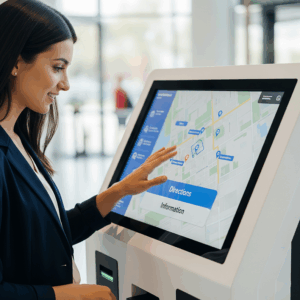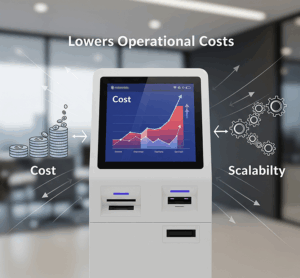
News & Updates

Kiosk Operation Solution: Transforming Service Across Industries
Kiosk Operation Solutions are rapidly redefining how industries deliver services, blending automation and convenience to create seamless experiences for both users and staff.
As organisations look to meet rising expectations, the adoption of modern kiosk technologies has become essential for operational efficiency and customer satisfaction.
From healthcare and government agencies to the transport and finance industries, these solutions
- automate everyday tasks
- streamline front-line interactions
- help maintain compliance in regulated environments
Whether you are seeking to reduce operational costs, respond to evolving digital demands, or build trust with clients and visitors, discover how a strategic kiosk deployment can transform your service landscape and position your organisation for sustainable success.
Improving Service Efficiency with Automated Self-Service
Automated kiosks are at the heart of a fundamental shift in how organisations manage routine service delivery. By transferring standard processes such as registration, check-in, and transactions from staff to intuitive user interfaces, service providers can dramatically improve operational efficiency. This transition frees employees more time to focus on higher-value activities that require a human touch. In high-traffic environments like hospitals, banks, and transport hubs, the impact is:
- Tangible queues move faster
- Bottlenecks are minimised
- The overall consumer service experience is elevated
For industries dealing with large volumes of daily visitors, the benefits of automated kiosks are particularly pronounced. Users can independently handle their requirements, reducing their reliance on counter staff and minimizing the risk of human error. By integrating with core systems, these kiosks ensure that information is accurately captured and processed in real time. The result is not just greater speed but also improved accuracy and consistency across all service touch points.
Faster Registrations and Reduced Queues
Kiosks excel at handling registrations and check-ins, allowing users to quickly input their details, verify identification, or select required services without waiting for staff assistance. This self-directed approach significantly reduces physical queues and enables a steady flow of users through busy environments. In healthcare facilities and government offices, where timely access is critical, the introduction of self-service kiosks has led to reported decreases of up to 40% in average wait times, according to current market data. The ability to process large numbers of visitors efficiently not only enhances satisfaction but also supports public health and operational continuity during peak periods.
By automating the initial stages of the service journey, kiosks reduce congestion and minimize the risk of service delays. This is especially valuable for organisations aiming to deliver reliable, predictable experiences for every visitor. The reduction in queues also creates a more welcoming atmosphere, contributing to positive impressions and encouraging repeat engagement.
Staff Redeployment for Higher-Value Activities
With repetitive tasks automated, staff are liberated from the front lines of transactional service. This enables organisations to redeploy their workforce to roles that directly enhance customer care, drive compliance, or address operational challenges. In banking and healthcare, for example, employees can focus on complex queries, personal consultations, or critical monitoring activities, rather than spending valuable time on routine data entry or check-ins.
This strategic shift in resource allocation not only improves job satisfaction among staff but also enhances the overall quality of service delivery. By enabling employees to engage in problem-solving and customer interaction, organisations can foster a culture of responsiveness and agility qualities that are essential for thriving in today’s dynamic service environments.
Enhancing User Experience with Intuitive Interfaces
Modern kiosk solutions are designed with user experience at their core, offering interfaces that are both simple and accessible. Touchscreen navigation, clear prompts, and responsive designs ensure that individuals of all backgrounds can interact with services confidently and efficiently. This focus on accessibility is crucial for sectors such as healthcare and public transport, where users may include the elderly, people with disabilities, or those unfamiliar with digital technologies.
The adaptability of kiosk interfaces extends to multi-language support and personalized guidance, making digital services truly inclusive. By removing barriers to access, organisations can ensure that essential services are available to everyone regardless of their technical proficiency or familiarity with the system. In addition, the integration of kiosks with online portals and mobile apps creates a unified service journey, allowing users to engage with organisations on their own terms. This seamless, user-centric approach is key to building trust and satisfaction in a digital-first world.
Multi-Channel Integration for a Unified Experience
Today’s kiosks are built to interact seamlessly with other service channels, including appointment systems, mobile applications, and web portals. This integration allows users to initiate a process online such as pre-registering for an appointment and then complete their check-in swiftly at a kiosk upon arrival. The result is a streamlined experience that reduces paperwork, eliminates duplicate data entry, and minimizes wait times.
For organisations, multi-channel integration supports consistent service delivery across touchpoints, ensuring that user data is synchronized and up to date. This holistic approach not only enhances user convenience but also improves operational visibility and process efficiency.
Boosting Security and Compliance in Regulated Environments
Security and compliance are paramount for organisations operating in regulated sectors such as healthcare, finance, and education. Kiosk Operation Solutions are engineered with these requirements in mind, incorporating
- advanced authentication protocols
- encrypted transactions
- detailed audit trails
By automating critical aspects of data handling and access control, kiosks help organisations maintain accountability and demonstrate adherence to stringent regulatory standards.
The ability to safeguard sensitive information while providing transparent, auditable records is a significant advantage in high- accountability environments. Secure kiosks not only protect organisations from data breaches and compliance risks but also reassure users that their personal information is handled responsibly. These features are essential for building and maintaining trust with stakeholders and regulatory bodies alike.
Lowering Operational Costs and Increasing Scalability
One of the most compelling advantages of automated kiosk solutions is their ability to reduce operational costs while supporting scalable service delivery. By automating repetitive front-line tasks, organisations can significantly reduce their reliance on manual labour, leading to leaner staffing models and lower payroll expenses. This cost-effectiveness is particularly beneficial for sectors with fluctuating demand or multiple service locations, such as retail, hospitality, and public services.
Kiosks also offer a flexible path to growth, enabling organisations to expand capacity or introduce new service points without major investments in additional floor space or personnel. Modular designs and compact footprints allow for phased deployments or rapid scaling in response to changing business requirements. As a result, organisations can adapt quickly to market trends and user expectations, ensuring consistent service quality across all touchpoints.
Flexible Deployment for Growth
Modular kiosk solutions can be introduced in stages, allowing organisations to scale their deployment in line with demand or budget constraints. Whether installed in large facilities or small satellite branches, kiosks adapt to a variety of environments thanks to their versatile designs.
This flexibility ensures that organisations can respond rapidly to growth opportunities or evolving user needs, maintaining consistent service standards even as operational complexity increases. The ability to deploy kiosks where and when needed supports business expansion and delivers a future-ready foundation for continued digital transformation.
Supporting Customization Across Multiple Industries
ATT InfoSoft’s Kiosk Operation Solution stands out for its flexibility and sector-specific adaptability. Designed to integrate seamlessly with existing IT systems, these kiosks can be tailored to the unique operational and regulatory requirements of industries ranging from healthcare and government to financial services and transport. The modular design enables the addition of specialized features or integrations, ensuring that each deployment aligns with the precise needs of the organisation.
Whether enabling patient check-ins at hospitals, streamlining visitor management at government offices, or facilitating transactions in bank lobbies, ATT InfoSoft’s kiosks support a wide spectrum of use cases. This versatility makes them an ideal choice for organisations seeking to modernize service delivery without compromising compliance or user experience. As industry demands continue to evolve, customizable kiosk solutions provide the agility needed to stay ahead of the curve.
Kiosk Operation Solutions are reshaping the way organisations deliver services, driving improvements in efficiency, security, and customer satisfaction while lowering operational costs. ATT InfoSoft’s modular, customizable kiosks empower businesses to meet rising user expectations, navigate complex regulatory demands, and scale operations with confidence.
By adopting the right kiosk strategy, organisations across sectors can future-proof their service delivery, respond proactively to change, and build enduring trust with users.
To discover how Kiosk Operation Solutions can transform your operations and support your digital ambitions, contact our team ATT InfoSoft at infosoft-sales@attsystemsgroup.com today for a tailored consultation.
Send us a message
Contact Information
Address:
35 Ubi Crescent, ATT Building, Singapore, 408585
Phone:
Email:
Website:
www.attsystemsgroup.com





